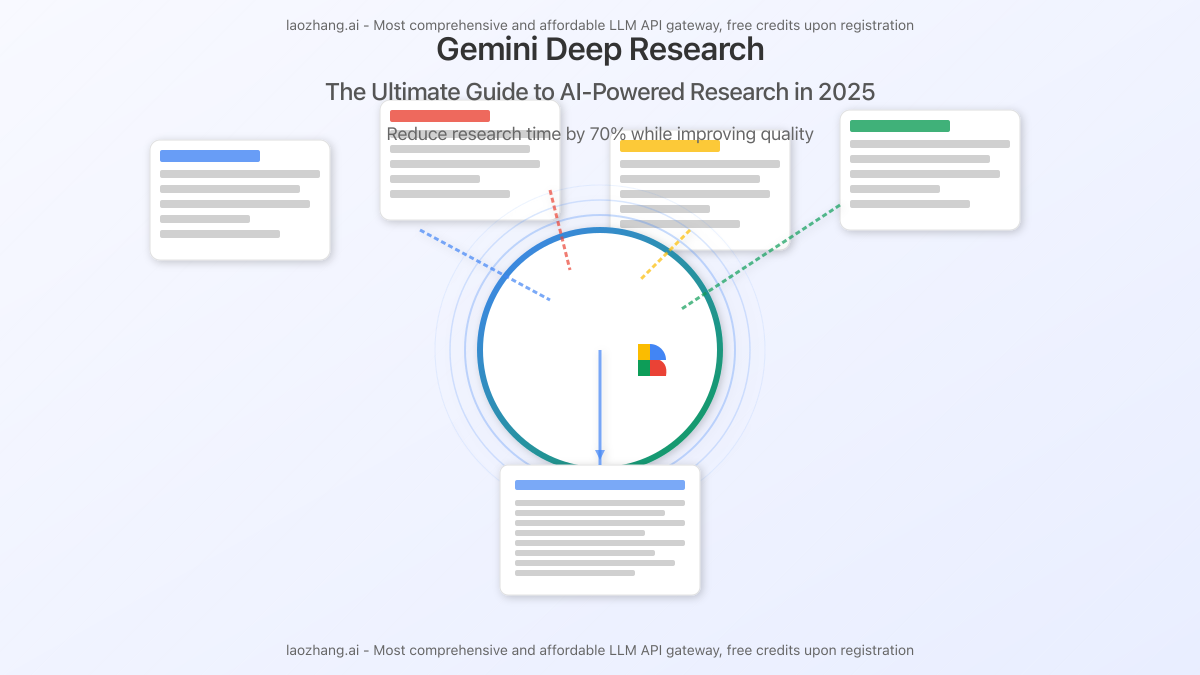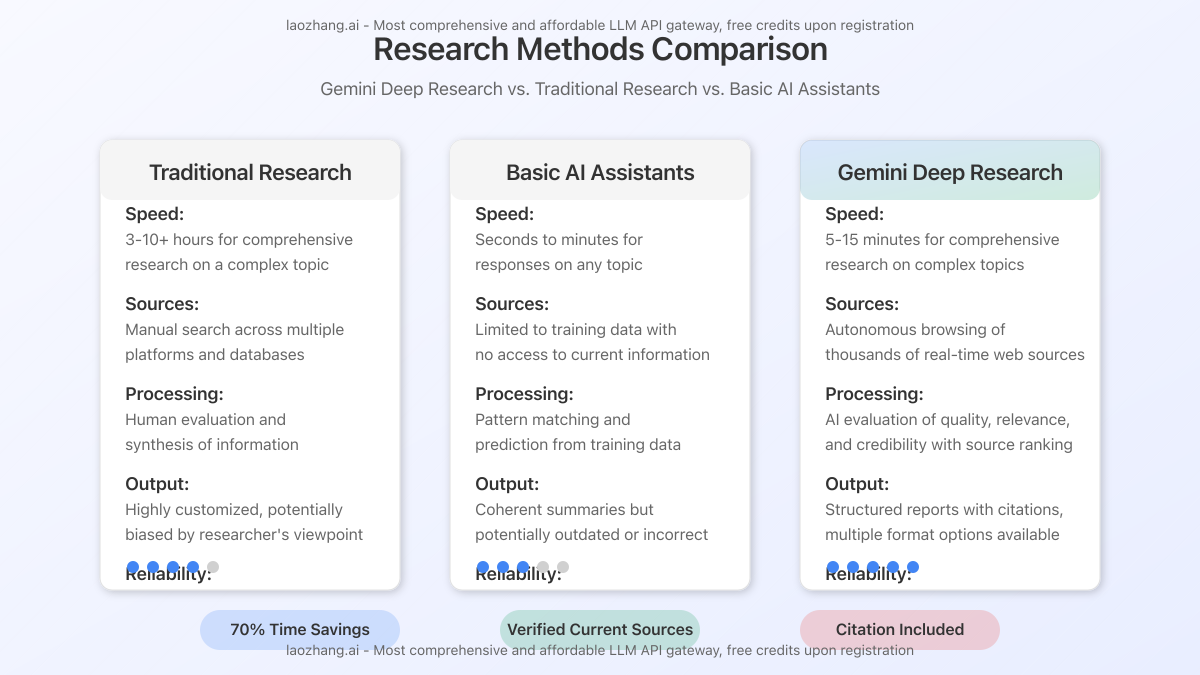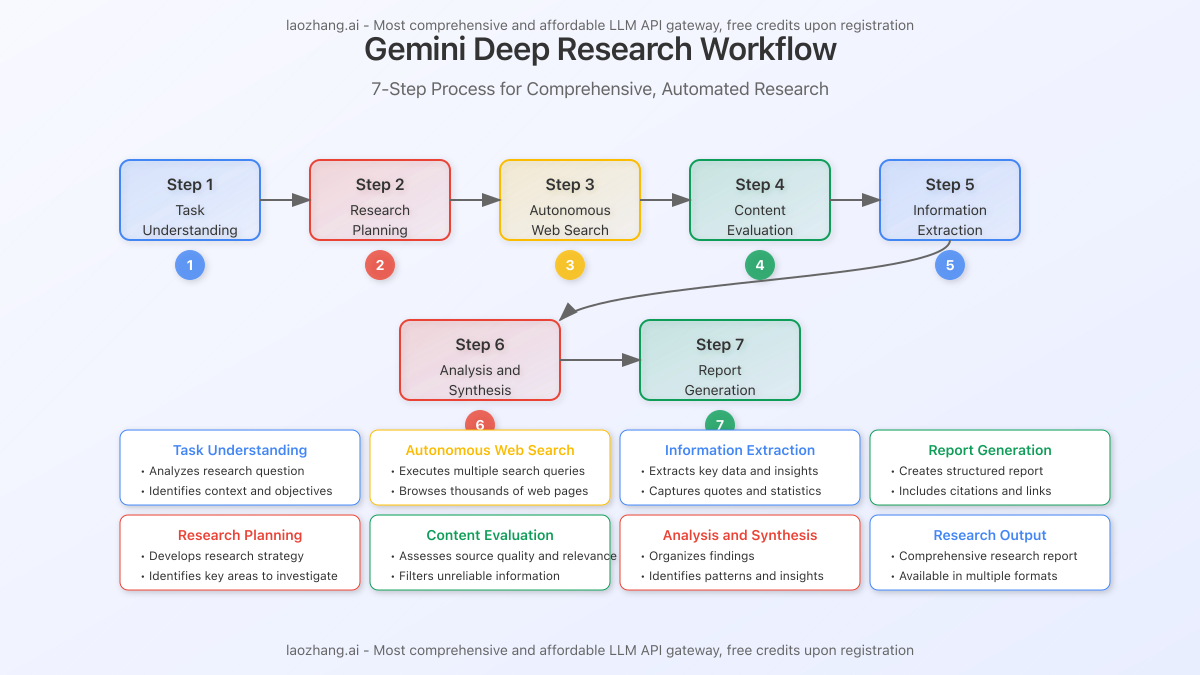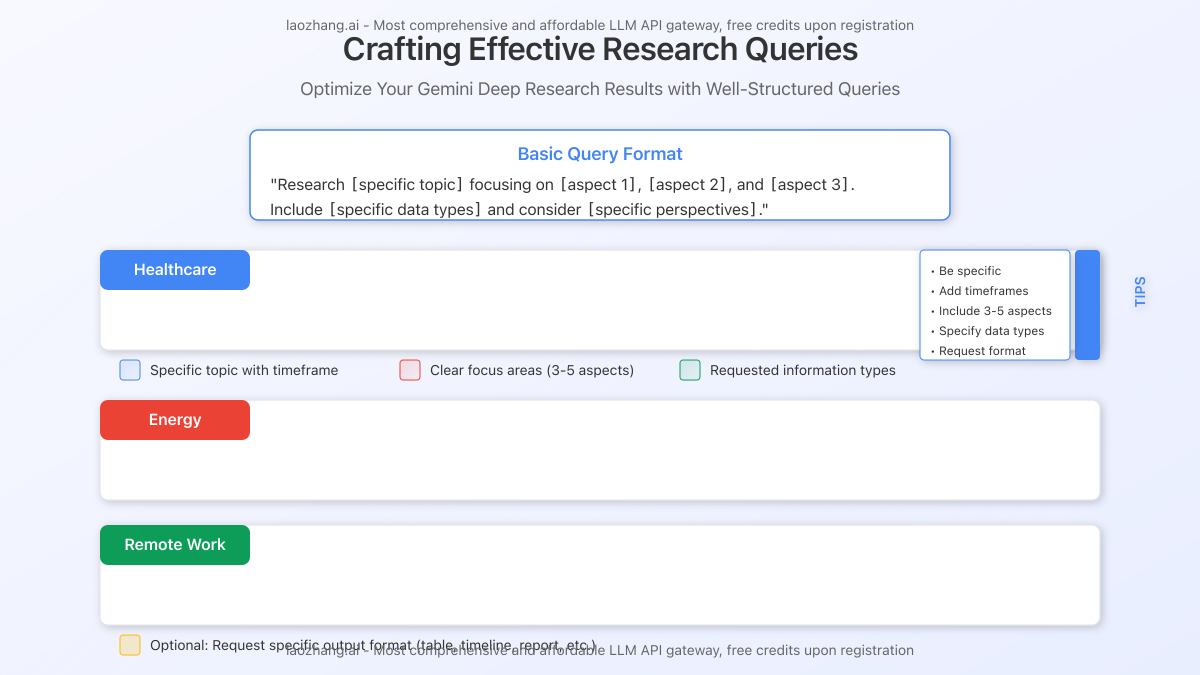
Tired of spending hours on research projects? Google’s Gemini Deep Research transforms how professionals and students conduct online research by automating search, analysis, and synthesis processes. This comprehensive guide reveals how to leverage this powerful AI research assistant to reduce research time by up to 70% while improving output quality.
What is Gemini Deep Research?
Gemini Deep Research is Google’s AI-powered research assistant that autonomously explores the web, analyzes information from thousands of sources, evaluates search results, and generates comprehensive reports on almost any topic. Initially available only to Gemini Advanced subscribers, this powerful feature is now accessible to all Gemini users across 45+ languages.
Unlike basic AI assistants that rely solely on their training data, Deep Research actively browses the internet in real-time, gathering fresh information and citing sources. This capability transforms it from a simple question-answering tool into a genuine research partner capable of tackling complex research tasks.
Key Features of Gemini Deep Research

Automated Web Exploration
Deep Research can autonomously browse up to thousands of web pages in minutes, extracting relevant information while filtering out low-quality sources. This capability alone can save hours of manual searching and sifting through irrelevant content.
Intelligent Search Result Evaluation
Not only does it find information, but Deep Research also evaluates the quality, relevance, and credibility of sources. It prioritizes authoritative content while filtering out unreliable or outdated information.
Comprehensive Report Generation
After gathering information, Deep Research synthesizes findings into well-structured, multi-page reports organized by topic. These reports include key insights, detailed analysis, and links to original sources for verification.
Format Flexibility
Research output can be generated in various formats including detailed reports, concise summaries, comparison tables, literature reviews, market analyses, and even presentation slides.
Source Citation
All information includes attribution with links to original sources, making it easy to verify information and explore topics further.
How Gemini Deep Research Works

The Deep Research process follows a sophisticated workflow:
- Task Understanding: Analyzes your research question to understand context, scope, and objectives
- Research Planning: Develops a structured research strategy with specific queries and angles to explore
- Autonomous Web Search: Executes multiple search queries across the web to gather relevant information
- Content Evaluation: Assesses the quality, relevance, and credibility of sources
- Information Extraction: Pulls key data, insights, quotes, and statistics from valuable sources
- Analysis & Synthesis: Organizes findings, identifies patterns, and generates insights
- Report Generation: Creates a comprehensive report with proper structure and citations
Getting Started with Gemini Deep Research
Accessing Deep Research
As of April 2025, all Gemini users can access Deep Research functionality:
- Visit gemini.google.com and sign in with your Google account
- For standard Gemini users (free tier): Select “Deep Research” from the dropdown menu in the top-left corner
- For Gemini Advanced subscribers: Access the enhanced Gemini 2.5 Pro with Deep Research option for more powerful capabilities
Crafting Effective Research Queries

To get the most out of Deep Research, structure your queries effectively:
Basic Query Format: “Research [specific topic] focusing on [aspect 1], [aspect 2], and [aspect 3]. Include [specific data types] and consider [specific perspectives].”
Example queries that produce excellent results:
- “Research the impact of artificial intelligence on healthcare in 2025, focusing on diagnostic tools, treatment personalization, and patient outcomes. Include statistics, case studies, and expert opinions.”
- “Conduct a comprehensive analysis of renewable energy adoption in developing countries, examining economic barriers, technology transfer challenges, and policy frameworks. Include recent projects, success metrics, and comparative data from 2020-2025.”
- “Research the psychological effects of remote work on employee wellbeing, productivity, and team dynamics. Include studies from the past 3 years, industry-specific trends, and recommended best practices.”
7 Practical Use Cases for Gemini Deep Research
1. Academic Research
For students and academics, Deep Research excels at literature reviews, background research, and identifying research gaps. It can efficiently compile and summarize relevant academic papers, identify key researchers in a field, and track the evolution of concepts over time.
Example Query: “Research the latest developments in quantum computing from 2023-2025, focusing on quantum supremacy demonstrations, error correction advances, and commercial applications. Include key research papers, major breakthroughs, and limitations of current approaches.”
2. Market and Industry Analysis
Business professionals can leverage Deep Research to analyze market trends, competitive landscapes, and industry developments. The tool excels at gathering data from multiple sources to create comprehensive market reports with minimal effort.
Example Query: “Create a detailed market analysis for the electric vehicle industry in Europe for 2025, including market size, growth projections, key players, consumer preferences, and regulatory environment. Identify emerging opportunities and challenges.”
3. Product Research and Comparison
Before making purchase decisions, Deep Research can compile comprehensive product comparisons based on specifications, user reviews, expert opinions, and pricing information across multiple sources.
Example Query: “Research and compare the top 5 enterprise cloud storage solutions in 2025, focusing on security features, scalability, pricing models, and customer support quality. Include actual user experiences, benchmark results, and total cost of ownership calculations.”
4. Content Creation and Fact-Checking
Content creators can use Deep Research to gather comprehensive background information, verify facts, and discover unique angles for articles, videos, or podcasts. The tool’s ability to find and cite sources makes it invaluable for fact-checking.
5. Legal and Regulatory Research
Legal professionals can utilize Deep Research to stay updated on changing regulations, case precedents, and legal interpretations across jurisdictions. The tool can compile relevant legal information and identify potential compliance issues.
6. Competitive Intelligence
Businesses can gather intelligence on competitors by having Deep Research analyze public information about company strategies, product offerings, market positioning, and customer feedback.
Example Query: “Research the top 3 competitors in the project management software market, analyzing their product features, pricing strategies, market positioning, customer reviews, and recent innovations from the past 12 months. Identify their strengths, weaknesses, and unique selling propositions.”
7. Technology Evaluation
IT professionals can use Deep Research to evaluate emerging technologies, assess implementation considerations, and forecast technology trends by analyzing multiple expert sources, case studies, and technical documentation.
Advanced Strategies for Maximizing Deep Research Results
Iterative Research Approach
For complex research topics, use an iterative approach:
- Start with a broad query to understand the landscape
- Review initial findings to identify knowledge gaps
- Follow up with more specific queries that target these gaps
- Continue refining until you have comprehensive coverage
Specifying Output Formats
Request specific output formats based on your needs:
- “…and present findings in a detailed comparison table with pros and cons”
- “…organize the information as a chronological timeline of developments”
- “…format the research as a SWOT analysis with key points for each category”
- “…create a decision matrix weighing different options against key criteria”
Targeting Specific Source Types
Guide Deep Research toward particular types of sources:
- “…focusing on peer-reviewed academic papers published since 2023”
- “…include analysis from industry reports by Gartner, Forrester, and IDC”
- “…incorporating insights from technical documentation and developer forums”
- “…using data from government publications and official statistics”
Limitations and Considerations
While powerful, Gemini Deep Research has important limitations to consider:
Depth vs. Breadth Tradeoffs
For very specialized topics, Deep Research may prioritize breadth over depth. For highly technical or niche subjects, you may need to guide it toward specialized sources or follow up with more targeted queries.
Access to Paywalled Content
Deep Research cannot access content behind paywalls, including academic journals, premium reports, or subscription-based websites. Results reflect what’s available on the open web.
Temporal Limitations
While Deep Research accesses current web information, it may not capture very recent developments (within days) as search engines and web crawlers need time to index new content.
Information Quality Variability
Despite its evaluation capabilities, Deep Research may occasionally include information from less reliable sources. Always review cited sources for critical research tasks.
Accessing Advanced AI Models for Your Projects
For developers and businesses looking to incorporate AI research capabilities and other advanced AI functionality into their own applications, LaoZhang.AI offers a unified API gateway that provides access to top AI models including GPT, Claude, and Gemini.
LaoZhang.AI’s API gateway offers several advantages:
- Unified Access: Single API endpoint for multiple AI models including Gemini
- Cost Efficiency: Significantly lower prices compared to direct model access
- Free Trial: Start with no upfront costs to test integration
- Reliability: Stable infrastructure designed for production applications
- Simple Integration: Standardized API format across different models
curl -X POST "https://api.laozhang.ai/v1/chat/completions" \
-H "Content-Type: application/json" \
-H "Authorization: Bearer $API_KEY" \
-d '{
"model": "gemini-pro",
"stream": false,
"messages": [
{
"role": "user",
"content": [
{
"type": "text",
"text": "Conduct research on renewable energy trends in Europe"
}
]
}
]
}'Sign up for LaoZhang.AI to access Gemini and other leading AI models through a single, cost-effective API.
Frequently Asked Questions
Is Gemini Deep Research free to use?
As of April 2025, basic Deep Research functionality is available to all Gemini users free of charge. Enhanced capabilities are available to Gemini Advanced subscribers (formerly known as Gemini Pro subscribers).
How accurate is the information from Deep Research?
Deep Research gathers information from across the web and includes source citations. While it attempts to prioritize reliable sources, users should verify critical information by checking the provided citations, especially for important decisions or academic work.
How is Deep Research different from a simple Google search?
Unlike standard search that returns links requiring manual review, Deep Research autonomously explores multiple pages, evaluates content quality, extracts relevant information, and synthesizes findings into comprehensive reports with proper attribution.
Can Deep Research replace human researchers?
While Deep Research dramatically accelerates information gathering and synthesis, it works best as a complement to human expertise rather than a replacement. Human judgment remains essential for critical analysis, nuanced interpretation, and evaluating research quality in specialized domains.
Does Deep Research use my search history or personal data?
Deep Research operates within Google’s privacy policies. It does not use your personal search history to inform research results unless you’ve enabled personalization features. Research sessions are subject to Google’s standard data retention policies.
How can I export or save Deep Research results?
Results can be copied directly from the Gemini interface. For Gemini Advanced users, additional export options may be available including direct export to Google Docs, PDF format, or email delivery of research reports.
Conclusion
Gemini Deep Research represents a significant advancement in AI-assisted research, enabling professionals, students, and curious minds to explore complex topics with unprecedented efficiency. By automating the labor-intensive aspects of research while maintaining human oversight, it empowers users to focus on higher-level analysis and application of information.
As the technology continues to evolve, we can expect even more sophisticated research capabilities, deeper integration with specialized knowledge sources, and improved analysis features. For now, mastering the strategies outlined in this guide will help you harness the full potential of this powerful research assistant.
For developers interested in bringing AI research capabilities to their own applications, LaoZhang.AI’s unified API gateway offers a cost-effective way to access Gemini and other leading AI models. Start your free trial today to explore how these advanced AI capabilities can enhance your projects.